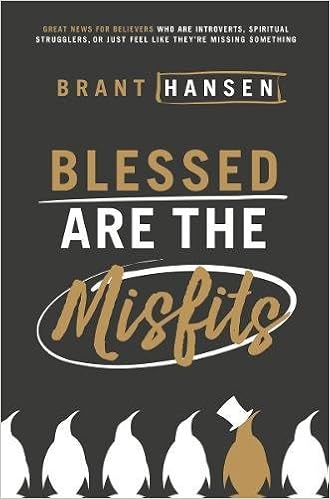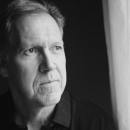Not everyone "feels" God's presence. Not everyone fits the idea of what it looks like to a be a "spiritual" person. Not everyone is emotionally moved by worship music, or prays easily. Many are often left wondering, "What's the matter with me? Has God abandoned me? Is there even a God in the first place...?"
And they often walk away.
Brant Hansen's new book BLESSED ARE THE MISFITS brings good news! Hansen's style is both highly insightful and just plain fun-to-read. He's a popular, nationally syndicated radio host, but he's also introverted, highly analytical, and skeptical by nature. BLESSED ARE THE MISFITS is stunningly, brutally honest, and it's leavened with a distinct, conversational, self-effacing humor that is a hallmark of Hansen's on-air, writing, and public speaking style.
Brant Hansen's radio show is carried daily by more than 200 stations nationwide. He's also a passionate advocate for CURE International, a worldwide network of hospitals that brings healing and the good news of God's love to children with correctible disabilities. For additional information, please visit www.branthansen.com.
Q: I am intrigued by the title of your new book, "Blessed are the Misfits." How do you define a misfit? Who is a misfit?
I'm really talking here about what I call "spiritual misfits", people who suspect, deep down, they're not ever going to be "good Christians."
In American evangelical culture, for example, there's so much emphasis, subtle and otherwise, on emotions, and feeling God's presence. There are a lot of us standing among you, say, on a Sunday morning, who really aren't feeling it. And we're left wondering, "Where am I in this? Am I doing this wrong? Something must be wrong with me. Maybe God gave up on me...?"
There are misfits like me who have Asperger's Syndrome. Misfits who are introverts and feel perpetually guilty about not being good at striking up conversations about Jesus. Misfits who know they don't pray enough, or pray much at all. Misfits who are believe in Jesus, but are also still skeptical and doubters-by-nature. Misfits who have been so burned by church experience and are just clinging to hope.
There are a lot of us. We'd really love to have some good news.
Q: Did you write this book based on your own struggles as a "misfit"? Tell us a little about some of your struggles.
The book isn't about me, per se, but absolutely, this book is borne of my own experiences. I've gone through a lot of stuff that hurts to think about, but ultimately, God is redeeming it. I see it happening. In the book, I talk about my painful experiences as a preacher's kid, and my experience as The Most Skeptical Man on the Planet. I'm a lot like Spock; something of a logic machine. I don't ever recall "feeling God's presence", or being overwhelmed by any feelings during the thousands of hours of worship music, lights, and fog machines I've been subjected to. There are a lot of people who can relate to this. God still loves us.
Q: What does spirituality look like for a misfit?
It looks like obedience.
Q: What if I'm not good at talking to people about my faith, or good at talking to people at all?
In the Bible, evangelism is a GIFT. That means not all of us have it. There are something like 59 "one anothers" in the New Testament, things people need to be doing to build up the body of Christ, and if I haven't been given the gift of evangelism, there are plenty of other things to do.
It's not that we shouldn't share our faith, but there are so many ways of doing that. We each should do the thing we are gifted to do, and root on the rest of us. Evangelism is a tricky subject, because so many of us have been told it's THE thing. We all are supposed to be great at it. But that's simply not an emphasis of the New Testament church. This shocks some people, but it's true. The real emphasis is on the one-anothers, and building each other up.
Q: Being an introvert myself, I like to keep to myself. So, what is the role of church for an introvert?
I spend a chapter on this. We have be part of a faith community. We have to confess sins to one another. We have to use our gifts for others' benefit. We have to call each other into account. We have to let other people call us out on things. We have to learn about God by perceiving others' relationships with Him, up close. We have to benefit from the wisdom of others in our lives, and they from ours.
If "church" is a big stage production, or a business, or an event-driven, religion-themed, not-for-profit entity, then introverts will always struggle to understand the point of involvement. But if it's a family, well, we all get to play.
Q: In the book, you write about hearing from God. Many of us have never heard God audibly, so what does it mean to hear from God?
I think God uses his people to speak into our lives. I know He does. He also breathes life into us through scripture. Of course, we need to be part of a community to really understand scripture together. But that's another way He speaks into our lives. He reveals Himself in nature, too. That's a beautiful thing.
I've never heard God's "audible voice", but I've grown in wisdom because He communicates in many ways, some I'm sure I'm not even aware of. He'll speak through donkeys, I've read.
Q: You also deal with depression. Where does a person who suffers from depression fit in the kingdom? Is depression a sure sign of a lack of faith?
Biblically, it's obvious it's NOT a lack of faith. I've struggled with the almost overwhelming sense that I'm a failure since age seven. Maybe before that.
David says to himself, "Why so downcast, my soul? Put your trust in God."
Depression can be physiologically based. Faith means responding to that by doing what David did, and speaking truth into the situation. I have to put my mind on what's TRUE, pure, and lovely. And the truth is that while I might feel useless and a failure, God does not see me through this lens. That's the truth.
Faith means saying, "Yes, this is how I feel, but my feelings are not the last word. God's truth is." And then acting out of that.
Q: How does your new book help a "misfit"? For those of us who are teachers and pastors, how does this book help us to minister to the "misfits" in our churches?
If we really want to minister - which means "serve", of course - we might want to re-examine how we "do church". People need to see how community can work, and how their gifts matter in building each other up. Honestly, those gifts go to waste if we teach them that church is something one "attends" or "goes to". Short of that, it can certainly help to remind people, early and often, that God isn't looking for emotion. He's looking for obedient hearts. He's looking for humility. That's something ALL of us can offer, right now. No one is locked out. Everyone gets to play!



















